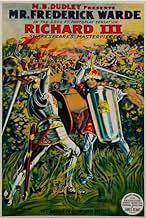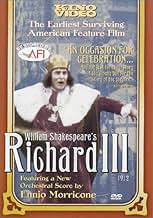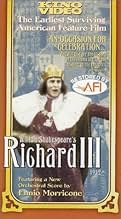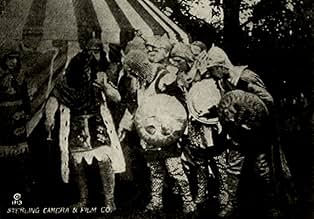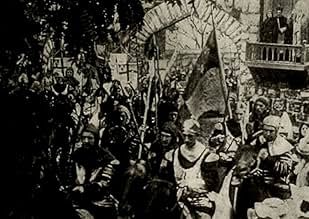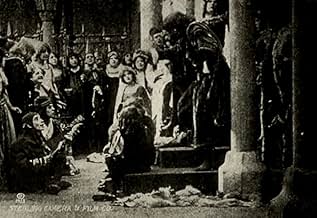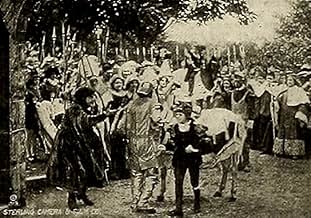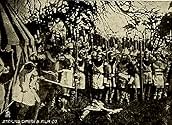Agrega una trama en tu idiomaRichard of Gloucester uses manipulation and murder to gain the English throne.Richard of Gloucester uses manipulation and murder to gain the English throne.Richard of Gloucester uses manipulation and murder to gain the English throne.
- Dirección
- Guionistas
- Elenco
- Dirección
- Guionistas
- Todo el elenco y el equipo
- Producción, taquilla y más en IMDbPro
Opiniones destacadas
Credited as the earliest complete feature-length American film known to still exist and restored by the American Film Institute, "The Life and Death of King Richard III" is otherwise of little value. Rarely is Shakespeare nearly as boring. Yes, the film is a symptom of its time; I also watched "Queen Elizabeth" (1912) today (it wasn't a very good day), and both are arid and static adaptations from the stage, histrionic acting included, but without sound, or any other qualities of the theatre. Films such as these, however, were coincident with films by others like D.W. Griffith; one can easily see which was advancing the medium and which was hampering it.
This was a very, very early full-length film. According to the video box, it was the first full-length American-made film, but that is debatable--as several films have made that claim and exactly what constitutes "full-length" is pretty vague. Regardless, I have to commend the cast for trying something unique and epic, though in today's light the film is a totally boring mess and only of interest to cinephiles. Instead of the modern notion of story-telling and action, the crew was breaking new ground and made a bizarre film that appears more like a series of vignettes instead of a coherent film. Instead of a moving and evolving narrative like we are used to, the film was made with a real-life traveling acting troop. But, instead of having them act out the story, the film shows inter-title cards that describe what has occurred and the cast pose like they are going to be photographed or just make a few minimal movements or actions until the next card appears to describe an all-new scene. It's almost like looking at a series of stereoscope cards that move just a little and all together tell a very, very dull story. Very static and horrid to watch, it DID try something different and this is an amazingly important film historically--I just would NEVER want to have to watch it again!
Besides its historical importance, this silent screen adaptation of Shakespeare's "Richard III" is a pretty good movie in its own right. It has several good features that compensate for the lack of dialogue and the other cinematic limitations of the time. The result is something a bit different from watching the play, but still a good story that does retain much of the emphasis of the original.
The adaptation is noteworthy for the liveliness and the detail that went into most of the scenes. They also made generally good decisions in adapting the story, by high-lighting the parts that would work most effectively on film without dialogue, and also in filming some events that were not actually in the play but to which characters in the play refer. While the lack of dialogue means that the character of Richard is not as complex as he is in the play, Frederick Warde does a good job of making his basic character come out. Some of his scenes work better than you might have expected them to without the advantage of spoken lines. The camera is fixed for each scene, as was then the norm, and it also uses the old-fashioned 'tableau' format, but there are a number of uses of cross-cutting, and there are also a couple of simple tracking shots at effectively chosen moments.
Overall, this is creative for its era, and it works quite well. It deserves to be seen in its own right, as well as for its more well-known historical significance.
The adaptation is noteworthy for the liveliness and the detail that went into most of the scenes. They also made generally good decisions in adapting the story, by high-lighting the parts that would work most effectively on film without dialogue, and also in filming some events that were not actually in the play but to which characters in the play refer. While the lack of dialogue means that the character of Richard is not as complex as he is in the play, Frederick Warde does a good job of making his basic character come out. Some of his scenes work better than you might have expected them to without the advantage of spoken lines. The camera is fixed for each scene, as was then the norm, and it also uses the old-fashioned 'tableau' format, but there are a number of uses of cross-cutting, and there are also a couple of simple tracking shots at effectively chosen moments.
Overall, this is creative for its era, and it works quite well. It deserves to be seen in its own right, as well as for its more well-known historical significance.
Watching Shakespeare without dialog isn't as challenging as you might think. Indeed, this 1912 film manages to condense the play neatly and still retains much of the power of the piece without hearing - or even reading - the words. Much of the success of "Richard III" is due to the vivid characterization by Frederick Warde, but his costars are excellent too. The direction is basic, of course, and every so often director-star James Keane wastes precious time (what's up with that long semi-tracking shot of the ship?), but generally his work is more than adequate. Comparing Keane's work here to the pioneering 1911 Italian feature "L'Inferno", it's clear that the American did have knowledge of what was going on elsewhere, even if he (of course) fell far short of what D.W. Griffith was already doing. Overall, "Richard III" will be of considerable interest to silent-film fans as well as stage performers interested in viewing the work of 19th century master Warde. Otherwise, I doubt this movie will thrill many other viewers. But I could be wrong; check it out for yourself.
Historically important as it is the oldest known complete surviving feature film made in the US, Richard III does a decent enough job of making Shakespeare's play accessible to the masses - although watching a Shakespeare play without words is like looking at a portrait in a dark room. The faces pulled by Shakespearean stage actor Frederick Warde suggest he thinks he's still playing to the Gods.
¿Sabías que…?
- TriviaThought lost for decades, but a pristine print (believed to be the oldest known complete surviving feature film made in the US) was discovered by a private collector in 1996 and donated to the American Film Institute.
- ConexionesFeatured in Keepers of the Frame (1999)
Selecciones populares
Inicia sesión para calificar y agrega a la lista de videos para obtener recomendaciones personalizadas
Detalles
- Fecha de lanzamiento
- Países de origen
- Idiomas
- También se conoce como
- Mr. Frederick Warde in Shakespeare's Masterpiece 'The Life and Death of King Richard III'
- Locaciones de filmación
- Productoras
- Ver más créditos de la compañía en IMDbPro
Taquilla
- Presupuesto
- USD 30,000 (estimado)
- Tiempo de ejecución55 minutos
- Mezcla de sonido
- Relación de aspecto
- 1.33 : 1
Contribuir a esta página
Sugiere una edición o agrega el contenido que falta

Principales brechas de datos
By what name was Richard III (1912) officially released in Canada in English?
Responda
